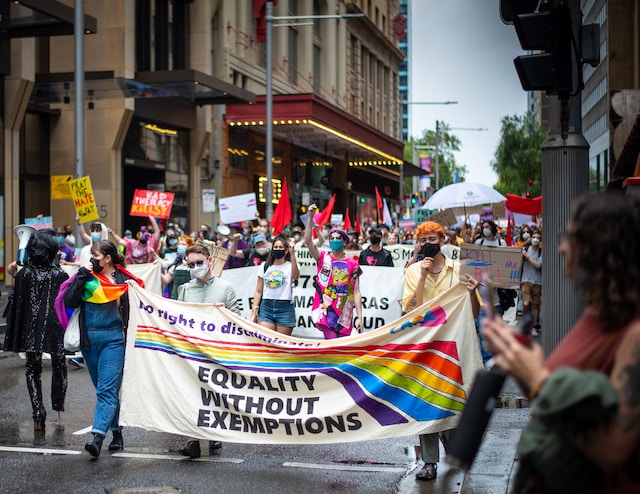Understanding the Complexities of LGBTQ+ Substance Use Triggers
Substance use within the LGBTQ+ community has long been a topic of concern and study. To fully address the issue, it is essential to delve into the intricate web of factors that contribute to substance use among LGBTQ+ individuals. While it is crucial to recognize that not all LGBTQ+ individuals use substances, this article aims to shed light on some of the complex triggers that can lead to substance use within this community. By understanding these triggers, we can work towards more effective prevention and support strategies.
Social Stigma and Discrimination

One of the most prominent triggers of substance use within the LGBTQ+ community is social stigma and discrimination. LGBTQ+ individuals often face prejudice, harassment, and even violence because of their sexual orientation or gender identity. This constant stress and discrimination can lead to feelings of isolation, depression, and anxiety. In an attempt to cope with these emotional burdens, some turn to substances as a form of self-medication.
Research has shown that LGBTQ+ individuals who experience higher levels of discrimination are more likely to engage in substance use. These individuals may seek solace in substances as a way to escape from the harsh realities of discrimination, creating a vicious cycle that can be challenging to break.
Minority Stress
Minority stress is a specific type of stress experienced by marginalized groups due to their minority status. LGBTQ+ individuals often face unique stressors related to their sexual orientation or gender identity. These stressors can include the fear of coming out, the experience of family rejection, or the challenges of finding acceptance within society.
Minority stress can lead to increased rates of anxiety, depression, and other mental health issues, which, in turn, can drive individuals towards substance use. The need to cope with these stressors may result in the use of alcohol, drugs, or other substances as a means of self-soothing.
Family and Social Support
Family and social support play a critical role in an individual’s well-being. For LGBTQ+ individuals, the level of support they receive from their families and social networks can significantly impact their substance use behaviors. Those who face rejection from their families or communities are more vulnerable to substance use as they seek alternative forms of support and belonging.
Conversely, LGBTQ+ individuals who have strong support systems in place are better equipped to navigate the challenges they encounter. Supportive families and friends can provide a buffer against some of the triggers that might otherwise lead to substance use.
Bar and Club Culture: How Addiction Affects the Community
The LGBTQ+ community has historically found a sense of belonging and acceptance in bars and clubs that cater specifically to them. While these spaces can be affirming and supportive, they can also be environments where substance use is prevalent. The normalization of substance use in some LGBTQ+ social circles can contribute to higher rates of use within the community.

It’s essential to recognize that while these spaces can provide community and connection, they can also be where addiction takes its toll. Substance use disorders can impact individuals’ health, relationships, and overall well-being, and this, in turn, affects the broader LGBTQ+ community. The repercussions of addiction extend beyond individual struggles and can lead to strained relationships, financial instability, and decreased overall community well-being.
Moreover, addiction can contribute to a cycle of vulnerability, as individuals who struggle with substance use may become more isolated and less engaged in community activities. This isolation can exacerbate the mental health challenges that LGBTQ+ individuals often face, making it even more challenging to break free from the grip of addiction.
Recognizing the impact of addiction within the LGBTQ+ community, it’s essential to create supportive environments that encourage connection and socialization without the need for substance use. By addressing addiction as a community issue and promoting healthier social norms, the LGBTQ+ community can work towards supporting its members in their recovery journeys. Additionally, providing access to LGBTQ+ affirmative substance use treatment and recovery resources within these social spaces can be instrumental in helping individuals struggling with addiction to seek help and regain their sense of community.
Mental Health Challenges
LGBTQ+ individuals are more likely to experience mental health challenges, such as depression and anxiety, compared to their heterosexual and cisgender counterparts. These mental health issues can be both a result of minority stress and a trigger for substance use.
Substances can offer temporary relief from the emotional pain and distress associated with mental health challenges. However, this relief is often short-lived and can lead to a reliance on substances to cope with ongoing mental health issues.
Lack of Accessible Healthcare, Including LGBTQ+ Substance Use Treatment
Access to culturally competent and LGBTQ+-friendly healthcare can be limited in many areas, leading to healthcare disparities within the LGBTQ+ community. This lack of access not only affects general healthcare but also extends to specialized services like LGBTQ+ Substance Use Treatment, which are vital for individuals struggling with substance use issues within the community.
Limited access can result in untreated physical and mental health conditions, making individuals more susceptible to substance use as a form of self-medication. Furthermore, when LGBTQ+ individuals do seek treatment, they may encounter healthcare providers who lack the understanding and sensitivity needed to address their unique challenges and needs. This can deter them from seeking help and perpetuate the cycle of substance use.
Addressing these disparities requires increasing the availability of LGBTQ+ affirmative healthcare services, including substance use treatment programs, and ensuring that healthcare professionals are trained to provide inclusive and culturally competent care. By doing so, we can reduce barriers to accessing essential healthcare and support LGBTQ+ individuals in managing their health and substance use concerns effectively.
Economic Disparities
Economic disparities within the LGBTQ+ community can also contribute to substance use. Research has shown that LGBTQ+ individuals are more likely to face economic challenges, including job discrimination, wage gaps, and housing instability. Economic insecurity can lead to stress and a sense of hopelessness, which may drive some individuals to turn to substances as a coping mechanism.
These economic disparities can intersect with other factors, such as mental health challenges and minority stress, creating a complex web of triggers that increase the likelihood of substance use. Addressing economic inequalities and providing support for LGBTQ+ individuals in securing stable employment and housing can be instrumental in reducing substance use.
Gender and Identity Exploration
For transgender and gender non-conforming individuals, gender and identity exploration can be a significant aspect of their lives. The process of self-discovery and transitioning can be emotionally challenging and stressful. Some individuals may turn to substances as a way to cope with the complexities of their gender journey.
Moreover, transgender individuals often face unique challenges within healthcare systems, which can delay or hinder their access to gender-affirming care. The frustration and dysphoria associated with these challenges can contribute to substance use as a means of escape.
Peer Pressure and Social Norms
Peer pressure and social norms can influence substance use within the LGBTQ+ community, just as they do in broader society. Some LGBTQ+ individuals may feel pressured to conform to social norms within their specific subgroups or communities, which can include the use of substances. This pressure can be particularly strong in environments where substance use is normalized or seen as a way to bond with peers.
It is essential to promote healthier social norms within the LGBTQ+ community and create spaces where individuals feel accepted without the need to engage in substance use.
Resilience and Coping Strategies
While substance use can be a negative coping strategy, it’s important to acknowledge that many LGBTQ+ individuals develop remarkable resilience and positive coping mechanisms to navigate the challenges they face. Resilience is the ability to adapt and bounce back from adversity, and many LGBTQ+ individuals develop strength and resilience in the face of discrimination and adversity.
Supporting and promoting these positive coping strategies, such as seeking counseling, joining LGBTQ+ support groups, or engaging in creative and community activities, can help reduce the reliance on substances as a means of coping.
Conclusion:
In understanding the complexities of LGBTQ+ substance use triggers, we’ve explored a wide range of factors, including social stigma, discrimination, minority stress, family support, bar and club culture, mental health challenges, healthcare access, economic disparities, gender and identity exploration, peer pressure, and resilience. Each of these factors plays a unique role in the substance use patterns observed within the LGBTQ+ community.
Addressing substance use within the LGBTQ+ community requires a holistic approach that considers these interconnected triggers. It involves fostering acceptance and support, providing accessible healthcare and mental health services, addressing economic disparities, and promoting positive coping strategies. By acknowledging and addressing these complexities, we can work towards a future where LGBTQ+ individuals can thrive in environments that support their well-being and reduce the reliance on substances as a means of coping.
Views: 19




